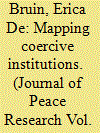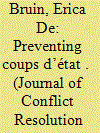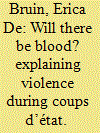| Srl | Item |
| 1 |
ID:
178688


|
|
|
|
|
| Summary/Abstract |
How rulers organize and use their security forces is thought to have important implications for regime survival, repression, and military effectiveness. While a number of studies provide insight into the coercive institutions of individual states, efforts to understand systematic patterns have been hampered by a lack of reliable data on state security forces that can be compared across states and within them over time. This article presents the State Security Forces (SSF) dataset, which includes 375 security forces in 110 countries, 1960–2010. It tracks how each force is commanded, staffed, equipped, and deployed, as well as the number of security forces and potential counterweights in each state’s security sector as a whole. After illustrating how the SSF dataset differs from related ones and presenting descriptive trends, the article shows how it can be used to deepen our understanding of coup-proofing and strategic substitution, and identifies additional research uses of the dataset.
|
|
|
|
|
|
|
|
|
|
|
|
|
|
|
|
| 2 |
ID:
160785


|
|
|
|
|
| Summary/Abstract |
Although coups remain a pressing concern for rulers across the globe, the mechanisms through which common coup-prevention strategies operate have not been well theorized or rigorously tested. This article analyzes how “counterbalancing” the military with other security forces prevents coups. Using new cross-national time-series data on state security forces along with evidence from sixteen case studies, the article demonstrates that counterbalancing reduces the likelihood that coup attempts will succeed and that it does so primarily by creating incentives for some soldiers to resist the coup, rather than by creating barriers to coordination between forces. However, counterbalancing is not associated with fewer coup attempts. In fact, the creation of a new security force increases the odds of a coup attempt in the following year. These findings highlight potential costs associated with counterbalancing and explain why it is not more widespread.
|
|
|
|
|
|
|
|
|
|
|
|
|
|
|
|
| 3 |
ID:
169000


|
|
|
|
|
| Summary/Abstract |
Although just under half of all coup d’état attempts involve fatalities, there has been surprisingly little attention to the conditions under which coups turn violent. Existing research emphasizes the incentives coup plotters have to avoid bloodshed but does not explain the conditions under which violence nonetheless occurs. This article develops a theoretical framework that predicts that the extent of violence that occurs during coup attempts will vary systematically with central features of incumbent regimes and coup plotters. It then tests these predictions using new data on the fatalities associated with 377 coup attempts between 1950 and 2017. Coups against military regimes are found to be less violent than those against civilian dictatorships. This is because military rulers are better able to estimate the likelihood of the coup succeeding and more sensitive to the costs associated with using violence to suppress a coup. Since their post-coup fates tend to be better than those of other authoritarian leaders, they also have fewer incentives to hang on to power at any cost. The analysis also demonstrates that coups led by senior officers involve less bloodshed than those by junior officers and enlisted men. However, coups against rulers that counterbalance their militaries are no more violent than those against rulers that do not. The results shed new light on the dynamics of coup attempts.
|
|
|
|
|
|
|
|
|
|
|
|
|
|
|
|